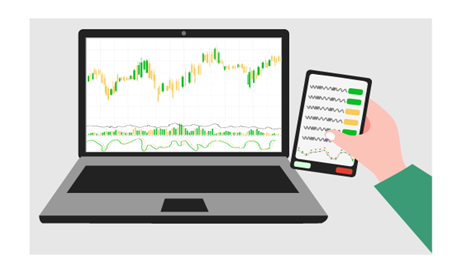Ready to see the market clearly?
Sign up now and make smarter trades today
Education
October 14, 2024
SHARE
The Dangers of Overtrading and How to Overcome Them
Overtrading can creep up on you unaware. You don’t even realize you are until you are overtrading in the middle of it. Let’s have a look at what this is and ways you can tackle and avoid it.
Overtrading is trading excessively, usually without a logical reason, and often due to emotions. In many such cases, over-traders do not have any strategy or have forgotten their pre-defined plan. They keep opening and closing positions without any trading discipline. This can lead to serious losses.
How did it come to this?
You can get caught up in overtrading due to a variety of reasons. They are mostly based on your mindset, and it is useful to understand your behavior from the point of view of trading psychology.
Lack of Trading Plan: Wish Upon a Star
A trading plan is a precise set of rules for entering and exiting trades. Importantly it should include limits and thresholds for stopping trading after a certain amount of loss, that is to say: this is the point when you walk away from the keyboard.
You should consider these amounts your personal mantras. Go through them before you start your trading day. Recite them out loud if you like.
When you buy and sell randomly, and without any backtesting or hypothesis as to how or why your strategy should work, you are actually making a wish, not trading, and you will inevitably end up overtrading at some point.
This is why it is essential to have a trading plan and stick to it. You can find some tips for making one in our article “How to create a trading plan“.
Revenge Trading: The Lose-Lose Scenario
Revenge trading is understandable. Traders trade to win and make money, and they feel angry and disappointed when they are on the losing side of a trade or a sequence of losing trades. This prompts them to immediately try to win again and to overtrade.
These feelings are normal and having a tested trading plan protects you from entering into illogical trades. It gives you a logical reason for entering and exiting a trade, along with risk management rules about handling losses. When you follow it, you can execute your strategy and not get carried away by your emotions.
For some, revenge trading can sometimes be caused by the belief that the market is “out to get you”. This is clearly irrational, but it could arguably be true. It may be a good idea to consider where you are entering trades and placing exit stops in relation to market positioning and market structure.
However, this line of thinking can often lead to a sense of “you vs the market”, which can make you more aggressive, and thus lead to overtrading.
Remember that the market is just a place full of many different participants, and it’s nothing personal—it’s all about liquidity.
FOMO: “This Is Going to Be the Big One”
Chasing every market move is simply unwarranted but FOMO (Fear Of Missing Out) is based on the anxiety created by missed opportunities. You start feeling that this next trade will be “the big one”.
This can also lead to overtrading. Note that the anxiety of missed opportunities may be coming from the fact that you could be trading with money you can’t afford to lose.
Smart traders know that you can never make a loss in a trade you were not in. There is always tomorrow.
Trading Your PnL: Watching the Scoreboard and Not the Game
Another issue—often the result of some or all the previously mentioned reasons—is trading your PnL (profit and loss). If, for example, you take a significant loss, then you may encounter the somewhat natural desire to make that money back.
However, at this point you are focused on your PnL and you are no longer looking at price action on the chart. You have become separated from market realities and are in effect watching the scoreboard and not the game.
The issue is, as an extension of trading without a plan, you will now make more illogical trades that will likely lead to further losses, resulting in the spiraling of negative emotions, feeding back on further losses.
How To Avoid Overtrading
There are many recommendations that help to avoid overtrading. Possibly the most important of these is to be self-aware enough to recognize when you are doing it. You can build this awareness by keeping a trading journal. or working with a mentor. Another useful tip is to understand that you do not always need to be in the market.
Have a Trading Plan (With Risk Management Rules)
Having a trading plan means you will have reasons for entering and exiting trades and rules for dealing with the inevitable losses and periods of drawdowns. If your plan is robust enough, you can execute it without having emotions take over.
Know Your Edge
Having a feel or deep understanding of your edge after extensive backtesting or forward testing, as well as live tracking and journaling of your strategy as you trade, will give you the confidence to stick with it and not fall victim to the kind of emotional vortexes that lead to overtrading.
Hone a Healthy Mindset
Yes, price manipulation does take place, but it is essential to avoid feeling like it is “you” vs “the market”. The goal of trading is to reach profitability, which in many ways is a battle against yourself rather than an unseen hand.
Furthermore, understand that losses are inevitable and, for some traders, are even a vital part of a trading strategy (for example, when hedging: by definition, one of the positions will likely result in a loss).
Finally, it is important to remember that sometimes market moves are only explainable after the fact, to accept “randomness”, and to have a good grasp on basic probability and statistics.
Do you want more information?
Visit the Bookmap website to learn more: https://bookmap.com
Also Check our special 50% discounts on all subscriptions from Nov 25 to Dec 2 for new users and upgrades on: https://bookmap.com/blackfriday
Also check out these other resources from the Bookmap blog and YouTube channel about trading psychology and emotional biases.
- Trading Psychology Tips and Tricks
- Video – Trading Psychology Mindset and Insights | Brett Steenbarger & Scott Pulcini | Pro Trader Webinar
- The 5 Most Common Trading Biases

